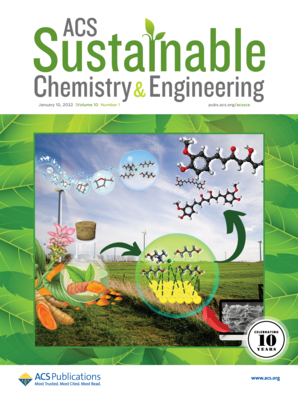全生物质纤维素磷酸盐热封薄膜和热稳定防溅杯,提高了可回收性
IF 7.3
1区 化学
Q1 CHEMISTRY, MULTIDISCIPLINARY
引用次数: 0
摘要
诸如稻秆之类的农业生物质是全世界产生的大量废物;通过堆填和焚烧处理这些废物是一项重大的全球性挑战。在本研究中,通过低成本农用化学品的脱木质素和磷酸化,开发了水稻秸秆的战略功能化,然后大规模加工成薄膜和饮料杯。高电荷含量(1488 ~ 2199 mmol kg-1)磷酸化膜在干湿条件下均表现出较高的机械强度,具有较高的热稳定性和阻燃性。利用FTIR和XPS光谱进行了详细的机理研究,证实了纤维素骨架上的共价键磷酸基团在加热时形成磷酸硅交键。有趣的是,全纤维素薄膜可以被热封,从而延长极易腐烂的水果和蔬菜的保质期。模塑杯具有高溶剂热稳定性,具有防起泡性和提高的可洗性(3倍)。将稻秆加工成包装薄膜和饮料杯的提议具有较低的生态影响和商业可行性,为无塑料世界提供了可持续的替代方案。本文章由计算机程序翻译,如有差异,请以英文原文为准。

All-Biomass-Derived Cellulose Phosphate-Based Heat-Sealable Films and Thermally Stable Antifizzing Cups with Improved Recyclability
Agricultural biomass such as rice straws represents a significant volume of waste generated worldwide; disposal of which through landfilling and burning is a major global challenge. In the present study, strategic functionalization of rice straws through delignification-cum-phosphorylation using low-cost agrochemicals followed by scalable processing into films and beverage cups is developed. The phosphorylated films with high charge content (1488–2199 mmol kg–1) show improved mechanical strength under both dry and wet conditions with high thermal stability and flame retardancy. A detailed mechanistic study using FTIR and XPS spectroscopy confirmed the covalently bonded phosphate groups on the cellulose backbone along with the formation of silicon phosphate cross-linkages upon heating. Interestingly, the all-cellulose films could be heat-sealed, improving the shelf life of highly perishable stored fruits and vegetables. Molded cups demonstrate high solvothermal stability with antifizzing and improved washability (for 3 times) post consumption. The proposed valorization of rice straws into packaging films and beverage cups with lower ecological impacts and commercial feasibility provides a sustainable alternative for a plastic-free world.
求助全文
通过发布文献求助,成功后即可免费获取论文全文。
去求助
来源期刊

ACS Sustainable Chemistry & Engineering
CHEMISTRY, MULTIDISCIPLINARY-ENGINEERING, CHEMICAL
CiteScore
13.80
自引率
4.80%
发文量
1470
审稿时长
1.7 months
期刊介绍:
ACS Sustainable Chemistry & Engineering is a prestigious weekly peer-reviewed scientific journal published by the American Chemical Society. Dedicated to advancing the principles of green chemistry and green engineering, it covers a wide array of research topics including green chemistry, green engineering, biomass, alternative energy, and life cycle assessment.
The journal welcomes submissions in various formats, including Letters, Articles, Features, and Perspectives (Reviews), that address the challenges of sustainability in the chemical enterprise and contribute to the advancement of sustainable practices. Join us in shaping the future of sustainable chemistry and engineering.
 求助内容:
求助内容: 应助结果提醒方式:
应助结果提醒方式:


